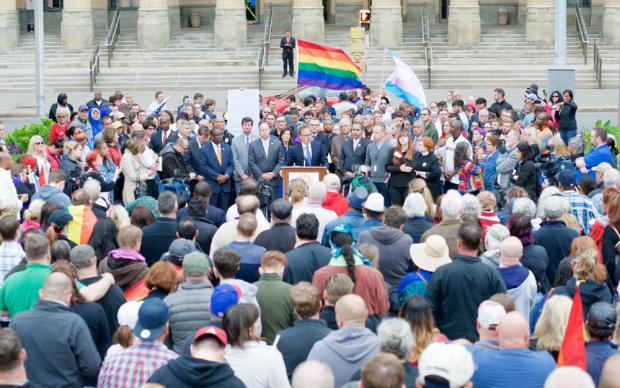Not in My Name: Thoughts on the Orlando Shootings
Roxy’s was the first lesbian bar I ever went to. I went there before I was out to my family, when I still responded to my given name and went by the pronoun “she.” I didn’t even live in the city of Buffalo then. I felt safe there. I had the freedom to be myself, a rarity in a world that otherwise told me, explicitly or implicitly, to be someone else, a little more feminine, a lot more straight.
When I moved back to Buffalo, I became a regular at Roxy’s. I, like so many others in this town, have endless memories that are associated with that place. I remember how I loved to dance there, even though the playlist hardly ever changed. Dykes and femmes would often make out at the bar. Drama-filled, alcohol-fueled fights and breakups were commonplace. Bathroom lines frequently came to a standstill on account of sexual experimentation. Conversations both profound and inconsequential took place on the stoop just outside where the smokers smoked and all tried their best to act cool. It was hallowed ground, a sanctuary for those who often found themselves on the outside looking in.
Saturday’s tragedy, the deadliest domestic terrorism attack in American history, took place at a LGBTQ nightclub on Latin night. A drag queen from Puerto Rico was scheduled to perform, and that would probably have been the most memorable part of the whole evening, had it not been for a homophobe who, permissioned by bigotry and hate, entered Pulse Orlando with an assault-rifle and massacred 49 people and injured 53 others, almost exclusively queer people of color (QPOC).
Instead, today, we find ourselves sifting through the emotional rubble, trying to make sense of that fateful night. The LGBTQ community, and tolerant people everywhere, are burdened with grief and despair, righteous indignation, and a deep sense of loss. Acceptance still seems so far off. And, yet, mourning in peace is a luxury that isn’t afforded to our community, nor our allies, in a time of such political expediency.
The United States is home to nearly a third of the world’s mass shootings, this one a domestic terrorist attack reminiscent of Charleston, South Carolina one year ago, where a mal-intentioned white shooter opened fire on the congregants of a historic African-American church. It’s self-evident to most at this point that the national conversation must be about sensible gun control and reform. Instead, the neoliberal and right-wing frame has consistently diverted attention away from action on the matter. Much like what is playing out right now in real time, anti-Muslim rhetoric increases and Islamophobia is encouraged, which results in an uptick in the number of hate crimes against American Muslims and mosques.
And, simultaneously, it has been these same politicians and leaders who have encouraged anti-LGBTQ rhetoric and policies, using their influence in the public sphere to take up issues that have violated the rights of LGBTQ people, including recent trans-panic bathroom laws and state challenges to the Supreme Court ruling to allow for same-sex marriage. They have deliberately trumped (pun intended) up the anti-LGBTQ and anti-Muslim sentiment, sanctioned violence, and handled their political responsibilities irresponsibly. And now we—the members of the LGBTQ community—are being called on to align with their ignorant and dangerous stance.
It has often been said, “Not in my name.” I add my voice to that list. I will grieve for those who are not with us, I will continue to fight like hell for those who are, but I will not denounce a religion, and I will not ask, nor expect, its leaders to condemn or apologize for anyone’s acts, regardless of how heinous they are. I will not be used to justify the military and prison industrial complex. I am a queer against Islamophobia, and I choose solidarity with Arabs, Muslims, and oppressed people worldwide. I resist the urge, like the trans and queer people of color at Stonewall who fought back against police brutality, to think that assimilation protects me. I honor their memory and the QPOC in Orlando when I put intersectionality at the forefront of my analysis.
And, as I and so many continue to heal, I want to lift up the many LGBTQ Muslims, who today are not sure what will be the cause of violence against them. May we be brave enough to acknowledge and affirm the humanity of those at the crossroads. May we be courageous enough to commit to a definition of wholeness that allows everyone the freedom to live as they are, and as they choose to be.

